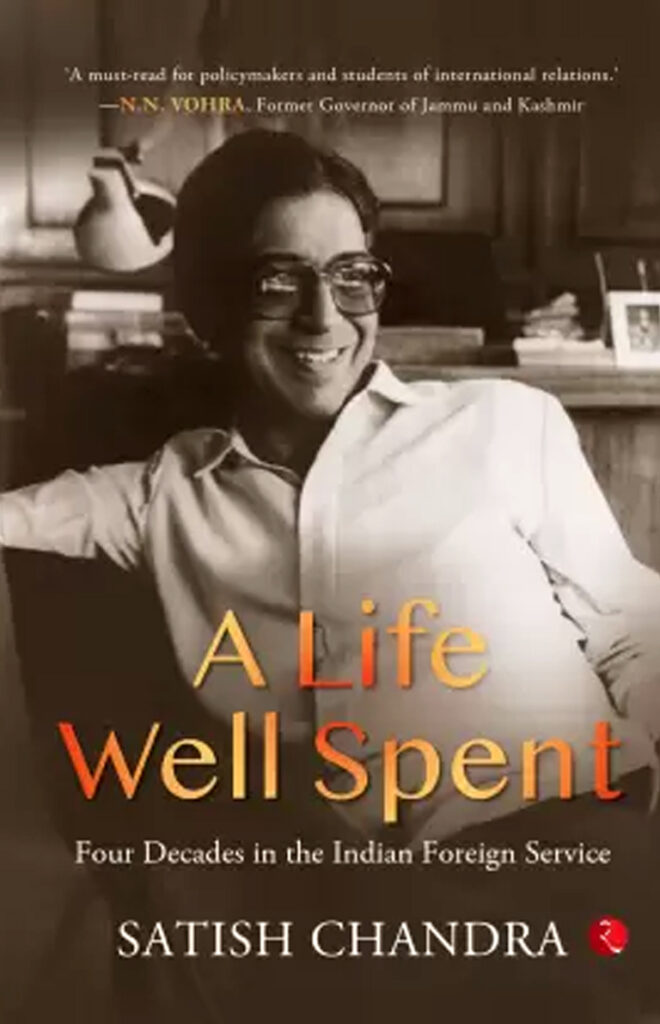The following has been extracted from the book, ‘A Life Well Spent’ by former diplomat and Deputy National Security Adviser, Satish Chandra.
As someone who belongs to what is now Pakistan and who has invested so much of himself in working for improved India-Pakistan ties, I cannot but be saddened by the fact that despite their shared heritage and innumerable commonalities, India-Pakistan relations have been troubled since inception. After much reflection and my dealings with Pakistan over the decades, I am of the view that this is in the main due to Pakistan’s visceral antipathy towards India, which regrettably animates all its actions.
Pakistan’s antipathy towards India is rooted in its failure at having established a sense of identity for itself and in using anti-Indianism as a glue to hold the country together. This has, over the years, metamorphosed into Pakistan’s search for parity with India. The fact that this is impossible because of India’s vastly greater comprehensive national power has added to Pakistan’s frustrations and animus against the former.
Pakistan has, of course, over time, sought to make up for its power differential with India by entering into opportunistic linkages with foreign players, by adopting a focussed policy of militarization and by creating an infrastructure of terror for use against India. These policies, instead of helping Pakistan, have hurt its evolution as a stable, economically prosperous and progressive nation. Opportunistic alliances have undermined its independence of action, militarization has come at the cost of democracy and development, and the use of terror has had a horrific blowback impact, making the country a hotbed of fundamentalism and extremist violence.
As detailed by me in a monograph:
The situation has been exacerbated by the fact that for much of its history Pakistan has been has been [sic] governed by a military junta—either directly or by remote. Genuine democracy has been unable to strike root in such an hostile environment. In order to keep themselves in power and democracy at bay, successive military regimes in Pakistan have also had a vested interest in vigorously promoting the idea of an Indian bogey. It is no surprise, therefore, that an adversarial mindset vis a vis India is inbuilt into the Pakistani establishment and has become a part of the national psyche.
It has been further underlined in the monograph that the Kashmir issue is merely an excuse for the troubled relationship. Were it to be somehow resolved, other issues would be found to keep the two countries apart.

Pakistan’s inimical mindset towards India finds expression in a multiplicity of activities designed to enervate the latter and, if possible, to promote its disintegration. These, inter alia, include the export of terrorism, attempts at exacerbating communal tensions, pumping in fake currency and drugs, and establishing a nexus with criminal elements for destabilizing the country. Clearly, it is this mindset that is at the root of the rocky India-Pakistan relationship and not the differences per se between the two countries…
Pakistan’s India policy and India’s Pakistan policy have been remarkably consistent. While the former has been characterized by unmitigated hostility and an unwavering effort to undermine India by all possible means, the latter has generally fluctuated between engagement or neglect and shown little inclination, barring in 1971, and as evidenced in the surgical and Balakot strikes, to impose costs on Pakistan. It is also an unfortunate fact that engagement has led more often than not to India making concessions, with Pakistan firmly sticking to its maximalist position.
India’s pusillanimity has emboldened Pakistan. Its default policy of engagement with Pakistan, spiced on occasion with outright appeasement, has not mitigated the latter’s hostility to India. Accordingly, a more proactive and sustained approach designed to impose costs on Pakistan for its use of terrorism as an instrument of foreign policy against us would be more appropriate in deterring it from so doing…
Unfortunately, many Indians, including those within my own fraternity, feel that we should continue to ‘manage’ relations with Pakistan as we have been doing for decades and desist from policies designed to impose costs on it…
The nature of Pakistan, in particular its mindset based on an inveterate hostility towards India, coupled with the abject failure of the latter’s conciliatory policy towards it, convinces me that such a policy must now make way for a more muscular approach. I am impelled to this viewpoint, since as long as Pakistan exists as we know it today, it will spare no effort to undermine India. In these circumstances, India must adopt a punitive policy towards Pakistan designed to deter it from its use of terror against India and to promote its disintegration.
Some of the elements of such a policy were spelt out in my monograph and are detailed below with appropriate elaborations:
- A vigorous diplomatic campaign to project Pakistan as a terrorist state accompanied by a call for imposition of international sanctions against it, including suspension of military and economic assistance. Such campaigns have been carried out in the past but have not produced the desired results, as they have not been pursued in a sustained manner and been stymied by our adoption, from time to time, of peace initiatives. Our campaign projecting Pakistan as a terrorist state can only succeed if it is pursued vigorously and in a sustained fashion till such time as its export of terror to India is definitively stopped. The credibility of our case on this account would be immeasurably strengthened if we develop a quantified tabulation of the damages suffered by us due to Pakistan’s relentless use of terror against us and a demand be registered for its compensating us on this account. In order to carry conviction with the international community, our campaign against Pakistan should be accompanied by an act of Parliament declaring it as a terrorist state, downgrading our representation therein to Chargé d’Affaires level, abandoning any high-level exchanges with it, and eschewing any CBMs with it. Pakistani institutions like the ISI should be branded as terrorist outfits, and its members and their relatives should be banned from getting Indian visas. The holding of multilateral military exercises or discussions on sensitive security-related issues with Pakistan, albeit within the ambit of entities like the SCO, should be scrupulously avoided in order to buttress the point that we regard Pakistan as a pariah.
- India should exercise full rights over the Indus waters as permitted under the Indus Waters Treaty. We have, so far, not done so and have not only not built all the storages permitted to us on the Western Rivers but have also allowed some of the waters of the Eastern Rivers to flow into Pakistan. This must be stopped forthwith by minimizing the release of the Indus waters to Pakistan and by maximizing their use in India as permitted under the Indus Waters Treaty. Some moves in this direction have been initiated by the Modi government. But progress has been slow. It needs to be greatly accelerated. Additionally, a notice should be served to Pakistan for a renegotiation of the Treaty, whereby India gets a fairer share of the Indus waters. While India has given a notice to Pakistan in end January 2023 for the modification of the Indus Waters Treaty, it is insufficient as it does not appear to be directed at securing a fairer allocation of the Indus waters but only at the functioning of the Treaty, including, inter alia, rectifying its material breach by Pakistan’s contravention of the graded dispute mechanism provided therein. India should, simultaneously, explore the possibility of walking away from the Treaty, as international law does envisage such a possibility in case of a fundamental change of circumstances. Pakistan’s use of terrorism against us in default mode, leading to a virtual state of war between the two countries, is arguably such a fundamental change of circumstances that could justify India’s walking out of the Indus Waters Treaty. In order to strengthen our position in the matter, we must, as mentioned earlier, quantify the damage suffered by India over the decades as a result of Pakistan’s use of terror against it. Such data would lend credence to our argument of the fundamental change of circumstances impelling us to abandon the Indus Waters Treaty, which had been concluded to promote peace and goodwill between India and Pakistan. Pending our walking out of the Indus Waters Treaty, we should, as suggested by Professor Brahma Chellaney, condition further consultations and information-related exchanges pertaining to the Indus Waters with Pakistan on its abandoning its linkages with terrorist outfits created by it for targeting India.
- Since Pakistan has consistently exploited India’s fault lines, our hesitation in so doing vis-à-vis needs to be abandoned and an appropriate strategy in this regard based upon deniability needs to be seriously considered. At the very least, we should not shy away from widely publicizing, including at all international fora, its human rights violations in Balochistan, Khyber Pakhtunkhwa, Sindh and PoK, as well as against the minorities. We should also provide asylum to such disaffected elements from Pakistan within the ambit of a broader asylum policy to be framed by us.
- Covert action, and if need be focussed strikes, should be undertaken on the lines of the Balakot strikes to take out terrorist elements and their supporters in Pakistan. Contingency plans for such actions should always be readily available and duly updated so that, following any Pakistan-sponsored terrorist action against us, as in Mumbai or more recently in Gurdaspur, Udhampur, Pathankot and Pulwama, these can be activated within a matter of hours rather than days.
- The already-crumbling Pakistan economy, rather than being the object of Indian assistance as in the past, should, henceforth, be targeted for damage with actions such as undercutting its rice and textile exports, withdrawing from the TAPI pipeline and ensuring that the European Union desists from continuing to allow duty-free ingress of Pakistani textile exports.
- India needs to cultivate good working relationships with both Afghanistan and Iran in order to enhance Pakistan’s uncertainty on its western borders. This is eminently doable notwithstanding the nature of the regimes in place in those two countries, as we have traditionally had good ties with them. While the Taliban factor is, no doubt, a serious issue with us, if we play our cards right and if Pakistan, as is its wont, remains hegemonistic, a modus vivendi with Afghanistan is a distinct possibility, as its national interests will impel it to mend fences with India. This is all the more so as, apart from the considerable economic assistance that could flow to Afghanistan from India, we have an additional major leverage as we can, at any time, announce that we do not recognize the Durand Line. No nationalistic Afghan and much less a Pashtun can avoid being enormously swayed in India’s favour should we adopt such a stance, as Afghanistan does not recognize it and, indeed, even the earlier Taliban government despite enormous Pakistani pressure refused to do so. Similarly, while we have, over the years, enjoyed a fruitful relationship with Iran, the latter’s ties with Pakistan have had their share of tension whether over Sunni-Shia issues or over Afghanistan. Unfortunately, India-Iran ties have, in recent times, been a casualty of US pressures, which need to be resisted to ensure that the relationship achieves its full potential.
To be successful, the aforesaid approach must be pursued in a sustained manner on a long-term basis.
Extracted with permission from “A Life Well Spent: Four Decades in the Indian Foreign Service”, written by Satish Chandra, and published by Rupa.

